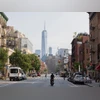Hong Kong begins public consultation to implement national security law
Officials have said the painful experiences of the 2019 protests demonstrated that national security risks are real
)
Hong Kong previously was unable or unwilling to enact the law
Listen to This Article
Hong Kong began work on a local National Security Law on Tuesday, more than three years after Beijing imposed a similar law that has all but wiped out dissent in the semi-autonomous city.
Hong Kong's mini-constitution, the Basic Law, calls for the city to enact a national security law, but it's been delayed for decades because of widespread public opposition based on fears it would erode civil liberties.
In 2003, an attempt to pass a version of the law sparked street protests that drew half a million people, and the legislation was shelved.
But the city's crackdown on political opposition likely clears the way for the bill to pass easily. Since 2020, many of the city's leading pro-democracy activists have been arrested, silenced or forced into exile. Dozens of civil society groups have been disbanded, and outspoken media outlets like Apple Daily and Stand News have been shut down.
The city did not release a proposed text, which will be written later based on input from public consultation. The public consultation period will begin Tuesday and will end February 28.
Also Read
City leader John Lee called the legislation a constitutional responsibility.
We shouldn't wait any longer, he said during a news conference. The threats to national security, they are real. We have experienced all these threats. We have suffered from them badly.
Both the Hong Kong and Beijing governments have hailed the previous National Security Law for restoring stability after the massive pro-democracy protests in 2019.
Lee said a local version is still necessary to keep Hong Kong safe against potential sabotage and undercurrents that try to create troubles, in particular surviving ideas about Hong Kong independence. Lee also said that some foreign agents may still be active in Hong Kong.
He said other countries, including the US, UK, and Singapore, have similar laws to safeguard security and Hong Kong would draw from them.
Critics worry authorities will use a domestic national security law as another tool to crack down on dissidents, further eroding freedoms that were promised to the former British colony when it returned to Chinese rule in 1997.
The Beijing-imposed security law criminalised subversion, advocating secession, and collusion with foreign forces to intervene in the city's affairs as well as terrorism, but did not cover all the offenses authorities wanted to target.
Lee also promised that people could still criticize the Hong Kong government and express opinions, as long as they do not intend to endanger national security.
The government has already muzzled most dissent using existing laws. Hundreds of people have been arrested under the 2020 law.
Some 47 people were charged under the 2020 law for participating in an unofficial primary election, and two were convicted during the same time under an older sedition law for clapping in court and insulting a judge during a trial.
Security chief Chris Tang said the legislation would cover the use of computers and electronic systems to conduct acts that endangers national security, as well as disclosing state secrets and espionage, treason and sedition.
Tang said the government will add new crimes including one that targets foreign interference.
Lee also promised that the law will not allow suspects to be transferred to mainland China for trial, unlike the 2020 law.
Following the consultation period, the proposed legislation will be drafted as a bill that will be scrutinized by the Legislative Council. Once the proposed law reaches the legislature, lawmakers are expected to pass the domestic national security law without much opposition in the three readings given a lack of opposition lawmakers following an overhaul of Hong Kong's electoral system.
Lee did not give a timeline for enacting the law, other than that it should be done as soon as possible".
Under Hong Kong's constitution, the city is required to enact laws on its own to prohibit seven types of acts: treason, secession, sedition, subversion against China's central government, theft of state secrets, foreign political organisations conducting political activities in the city and local political organizations establishing ties with foreign political groups.
More From This Section
Don't miss the most important news and views of the day. Get them on our Telegram channel
First Published: Jan 30 2024 | 10:56 AM IST
